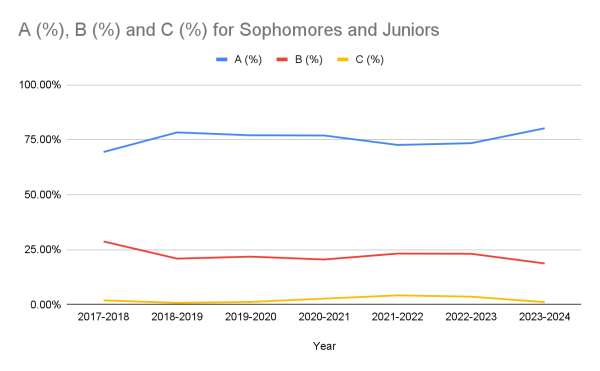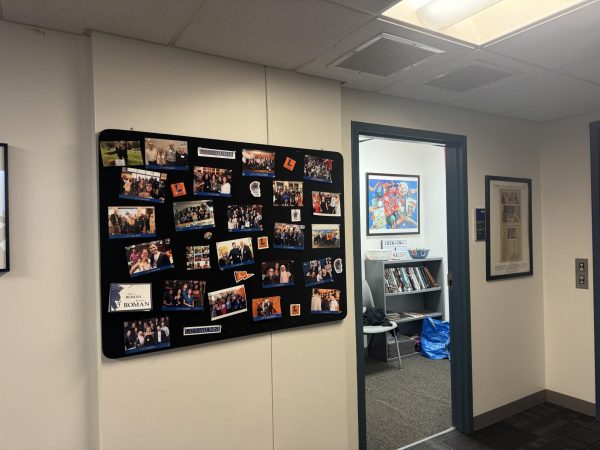More and more classes are switching to Standards-Based Grading
Among other changes brought by the new academic year, the conversion of several departments to the Standards-Based Grading (SBG) system is perhaps the most jarring for students. While select classes had already made the switch, the first semester of remote learning has prompted more to do the same. Such a unique style of grading does come with varying opinions, however, and these will likely be addressed by the school as the year progresses.
Over the past two years, SBG has assumed a prominent role strictly in the Science Department, with an aim to focus grades on a demonstration of mastery rather than a letter. “Most of the time, I find myself stressing about tests and quizzes because of the grade I will receive, but with SBG I find myself learning more, as it’s a low risk environment that I really enjoy,” said junior Ally Ryan. When students complete assignments that correspond to specific learning objectives, teachers assess whether or not they have demonstrated an appropriate level of understanding. This assessment occurs on a number scale, which then translates to a letter grade on a student’s transcript.
Perhaps the most valued facet of SBG is its encouragement of reassessments. The opportunity to learn from past errors and grow as a result is placed at the forefront of the system, which has fared quite well with students thus far. “The reason I prefer SBG,” said junior Sean Episcope, “is because we can reassess on any topic that we initially fall short on and not on the things that don’t require more work.” Such a sentiment does not go unnoticed by teachers, either. “Often it takes students some time to master a science skill or learning objective,” biology teacher Sarah Kutschke said. “Giving students an opportunity to reassess reinforces their understanding as they build upon their academic foundation.” This pillar of SBG is what allows its adaptation to nearly any learning environment, and a primary reason many classes are beginning their transition to the program.
The department in which many anticipate particular success with SBG is Language. “Personally, I believe SBG is a more equitable approach to measure growth consistently and help students improve their language proficiency,” said Department Chair Xavier Espejo. “As a teacher, SBG allows me to help students gradually progress and develop their skills rather than subjectively attempt to find ways to quantify learning.” Senior Theo Kokonas, a member of Honors French: Intermediate High Literature, noted, “In my opinion, language is one of, if not the subject where standards-based grading is most apt. While in some other courses, material can be appropriately taught on a unit-by-unit basis, units in language mostly only correspond to what type of vocabulary the students learn.”
Given that the four central aptitudes for assessment—reading, writing, listening and speaking—are constantly being developed throughout the year, one’s performance in any quarter is subject to a misrepresentation of their proficiency as a language student. “As a department,” noted Mr. Espejo, “we realized that students’ grades should reflect their ability to interpret and produce the language and not just arbitrary numbers that may reward completion, participation or finishing assignments on time. Instead, SBG allows teachers to assess holistically using rubrics and providing extensive feedback to help students develop their skills in a non-threatening manner.”
And while this collective determination of teachers to adapt to a new style certainly has the potential to make both learning and teaching more meaningful, it will not come without obstacles. “I’ll admit, I certainly don’t expect the transition to be smooth, as the transition in the sciences was not,” Theo said. “However, I’d say any upcoming troubles are more likely to be temporary setbacks that the Language Department will need to overcome, rather than a true indication of the flaws in standards-based grading.”
The better part of both the student body and its teachers have agreed that the SBG system shows great promise. In the Science Department alone, it has proven successful in providing a framework to consistently measure student progress. Teachers’ ability to have an ongoing comprehension of students’ mastery allows for adapted styles of education that better accommodate students’ needs. By and large, this system has ultimately led to more engaged learning that will optimistically continue throughout the coming semesters. “With all of the chaos that this year has brought,” said Ms. Kutschke, “I hope that SBG takes some of the pressure off of students as they know that there will be constant opportunities to demonstrate mastery, even if it doesn’t happen the first, second or even third time around.”

McKenna Fellows (‘22) is a senior at Latin, and is elated to serve as one of this year’s Editors-in-Chief. She is an avid reader and writer, and in...
























































